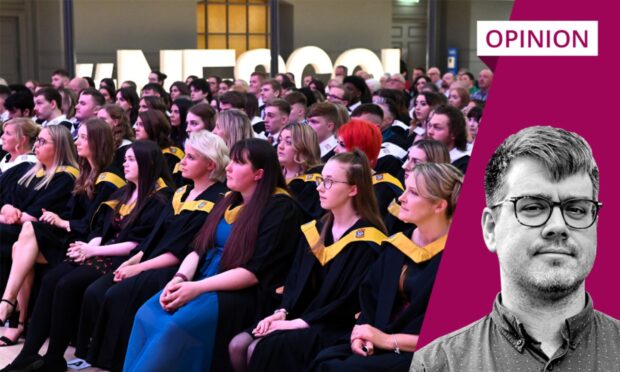This may, or may not, surprise you, but I wasn’t really the most attentive pupil when I was at school.
A touch over twenty years ago I left Banff Academy with decent Standard Grades, but only two Higher passes and Intermediates after two years of attempts to do better.
Being honest I look back on my efforts at school with quite a lot of regret – I spent far too much time mucking around and not pushing myself, daydreaming at best and being disruptive when at worst.
When I was nearing the end of school, I wasn’t hugely sure what I was going to do next, being slightly unprepared.
But I was lucky – although my qualifications, and at the time, my level of maturity, weren’t likely enough to get me into University, I was accepted to a place in what was then Aberdeen College, now Nescol, to study Media & Communication.
As such, I managed to leave Banffshire with a close pal, who was also accepted on the same course and moved to Aberdeen.
After two years I completed my HND and aced the final project. I am still really proud of what I achieved there.
I can’t think what I would have done otherwise. I can’t imagine I would have followed my Dad into fishing, never having the sea-legs for it. And I don’t see that I would have ended up in a trade – I was always better with a pen when it wasn’t stuck inside a compass.
Nescol was a lifesaver for me
Aberdeen College was a lifesaver for me. It meant I could leave home, learn skills and crucially spend a bit of time growing up. Eventually, it did lead me to university, where so many of my smart cookie pals from school had gone two years earlier.
Now, I reflect on it as a crucial point in my life; maybe THE crucial point in my life. I met friends I still have. I found that I was good at a wider range of subjects than just English. I found direction and avoided any other more destructive paths.
It has left me a huge advocate for Nescol and everything it does.
It’s therefore upsetting to read about funding issues at Nescol and reports that it is having to turn applicants away due to a lack of resources to deliver courses.
It makes me sad – the idea that others might not be afforded the opportunity that I had at the Gallowgate campus. To have the experiences I had there, learning a broad base of subjects that really built on what I was good at, in an environment that always felt more personal than the one I later experienced at uni.
One recommended Belleville Rendezvous, and I may have skipped his class to catch the last screening. Sorry, Bill.
I continued to have those experiences with Nescol through my working life – to do personal licence training when I started running the bar at Belmont Cinema, or to work on the Nescol Film Festival with the Creative Industries departments when I became Cinema Manager.
It’s hard to exaggerate the impact the college has on the north-east
And as for me, it’s hard to exaggerate the impact that the College has on the north-east, in training and supporting our skills base in the region.
Many of those students I met during the film festival have stayed working in the creative sector in the city – and some even make feature films here now and train the next generation of creatives.
So hearing of financial constraints is therefore worrying.
In addition to the recently announced savings drive at Aberdeen University and the redundancies at Robert Gordon University, it paints a grim picture for the north-east’s further education institutions.
The education sector has faced real-term cuts for years, as the costs associated with running campuses have ramped up.
At times, it feels as if the whole thing is on somewhat of a precipice.
Institutions are resilient and while I’m sure Nescol and the universities will emerge from the other side of current hardships, it’s hard not to think about the individuals who they may be currently unable to support due to a tightening of the purse strings.
Those learners, both old and young, who might need a steer at a pivotal point in their life.
Nescol especially supports a huge amount of school leavers from the immediate region – 35% of them in the city and Aberdeenshire – who perhaps need those further steps in order to find themselves before entering the workforce full-time, like I did.
Many of those will have additional support needs; and come from either areas of deprivation, or areas lacking in employment opportunities, as I did.
I hope that resolutions can be found with funding so that everyone who wants to go on to learn there can. I’m sure the experience will be just as important for the majority of them as it was for me.
Colin Farquhar works as a creative spaces manager and film programmer in the north-east culture sector


Conversation